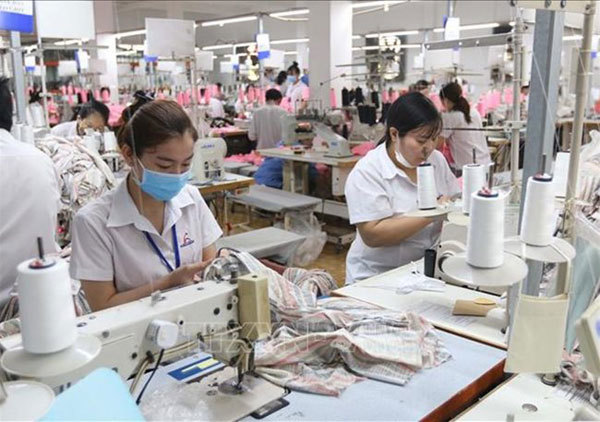 |
| People work at a clothing company in HCMC. The current wave of Covid-19 is severely impacting Vietnamese manufacturers. - Photo: VNA |
Rates of decline in output and new orders quickened from the previous month and employment was down sharply amid reports of temporary company closures and social distancing restrictions, according to the latest report of IHS Markit.
Disruption was also felt in supply chains, with delivery times lengthening to the greatest extent in more than 10 years of data collection.
The rate of input cost inflation accelerated sharply, but efforts to secure orders meant that firms raised their selling prices at a relatively modest pace.
The Vietnam Manufacturing Purchasing Managers' Index (PMI) ticked up to 45.1 in July from June's reading of 44.1. However, the latest figure signaled a marked deterioration in business conditions across the sector for the second month in a row.
Evidence from manufacturers highlighted the impact that the latest Covid-19 outbreak has had on operations. Some firms were forced to close temporarily, while others had to operate with reduced capacity due to social distancing measures.
These effects, alongside a marked drop in new orders, resulted in a further sharp reduction in manufacturing production at the start of the third quarter.
The decline in output was softer only than that seen following the initial outbreak of the Covid-19 pandemic in March and April last year.
Alongside lower new orders, new business from abroad was also down. However, the reduction in exports was softer than that seen for total new business amid some reports of improving demand in international markets.
Lower workloads, temporary closures and limits on staff numbers due to social distancing requirements meant that employment decreased markedly for the second month running.
While disruptions to operations led backlogs of work to build up at some firms, this was outweighed by a sharp drop in new orders. Overall, outstanding business decreased moderately.
The severe disruption to supply chains was noted in July, with the extent of delivery delays being the most marked since the survey began more than a decade ago.
Panelists linked longer lead times to difficulties with transportation both domestically and internationally due to the pandemic, as well as raw material shortages.
Manufacturers were also faced with surging input costs, as the rate of input price inflation accelerated to the fastest since April 2011. Higher costs for raw materials such as iron and steel, products imported from China and freight charges were all reported by respondents.
While some firms passed on these higher cost burdens to clients, others were reluctant to do so given the weak demand. As a result, the rate of output price inflation was much softer than that seen for input costs, suggesting pressure on profit margins.
Concerns around the ongoing impact of the pandemic meant that business confidence remained below the series average in July, although firms remained optimistic overall of output growth over the coming year.
“The sector is likely to remain under pressure and struggle to generate growth until the outbreak can be brought under control, so it will be important to keep watching the COVID-19 case numbers for signs of improvement," said Andrew Harker, economics director at IHS Markit.
Source: SGT

Huge challenges ahead for economic growth amid COVID-19 outbreak
The COVID-19 outbreaks in Ho Chi Minh City and many southern provinces are destroying the "health" of local businesses and hindering economic recovery,